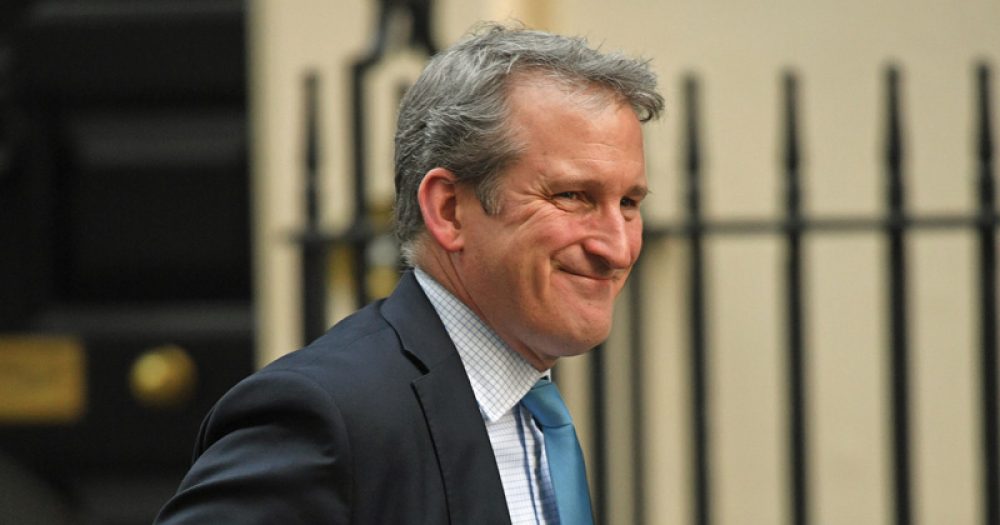The new education secretary Damian Hinds spoke of the need for schools to focus on core subjects like maths, English and science in his first speech since starting the job almost two weeks ago.
Addressing the Education World Forum in London, Hinds said he wanted pupils to have an “international perspective” and “very wide horizons”, and said workplace and character skills needed to be “built up” while pupils are at school.
He said preparing pupils for the “fourth industrial revolution” – a term used to describe the technological advances made in the last decade – was crucial to their future success.
“The pace of change we face today is so much greater than it has been in the past.
“We need to make sure that as our economies evolve, as our society evolves, we need to make sure that in the world of education we are absolutely on top of it.”
Core academic subjects such as maths, English and science were “at the heart” of such an education, Hinds concluded. But he also emphasised the £84 million committed by the government last month to training more computer science teachers, and teaching pupils “digital skills” that would match a “modern economy”
“Soft skills” and character were also highlighted by the secretary of state. Hinds said their importance was particularly impressed upon him during his tenure as an employment minister.
The ethos of a school and extracurricular activities helped pupils build both “character and workplace” skills, he said.
Hinds went on to say technology must also “play a role” in reducing teacher workload, and spoke of the importance of “sharing information globally”.
He acknowledged that workloads were “quite rightly” a matter of “great importance to teachers in this country”, and that technology could be used to help ease the problem.
More to follow.







Hinds is regurgitating what Gibb’s already said about the number of pupils in good or better schools and the PIRLS results almost word for word. And what on earth does ‘our recent rise up the international rankings for reading and literacy puts England’s achievements on a global scale’ actually mean? Any country which entered PIRLS would be ‘on a global scale’ whether top or bottom because that’s how PIRLS results are ranked (ie on the global scale called PIRLS).
Hinds, like Gibb, bangs the drum for Maths Mastery. But while the EEF Toolkit found ‘mastery learning is a learning strategy with good potential, particularly for low attaining students’, it stressed that studies into maths mastery showed results tended to cluster at two points: ‘little or no impact’ or ‘impact of up to six months’ gain’. In other words, mastery could be very effective or it could have no effect.
Perhaps it’s time for new Ed Secs to look at evidence. If he just repeats what another minister has said, then it raises the question of who is really in charge.
The extra money being given to training Computer Science teachers is pointless. This government say they wish to train 8000 more CS teachers, why? A quick check of TES and ETeach shows about 100 vacancies across the UK, the reports from the Royal Society and the University of Roehampton show that only around half of schools offer Computer Science even though it counts toward the EBacc. Many schools work around the offering as EBacc by forcing students to do triple or double science thus negating the need for computer science as an offering for the EBacc bucket, it then gets relegated to the other options and students are warned that it is not easy.
There are very few examples of technology being anything but a disaster in schools, a waste of time and money. Invariably, said new technology is rushed into schools without a proper pilot being done over time to identify and address problems. There is usually then inadequate training done on the cheap in the first few years of introduction. After a few years, the training budget usually then runs out so new joiners to a school or NQTs get none and avoid the technology because they can’t use it. The money for the new idea is usually there at the start but then disappears after a few years, so when equipment breaks down, it can’t be replaced and leaves teachers stranded and having to go back to the original ways of doing things. Support is nearly always inadequate so when a problem arises, it doesn’t get solved for months, if at all – no good for teachers. And any new piece of kit or new software assumes that teachers have the time to drop everything and become experts in it. This is of course never the case, as teachers, already stretched to the limit, resent having to add yet a new thing to learn on top of all the other things they have to do. Technology rarely saves anyone any time or money in the first few years of introduction, but by then, the Minister’s bright new idea has run out of money and steam and gone tits up.
When I wrote my comments above I was using the DfE press release which covered the speech. But when I checked the speech I found the quotes I discussed above weren’t in the speech. Why should a DfE press release be so at odds with what Hinds actually said? http://www.localschoolsnetwork.org.uk/2018/01/were-in-alice-in-wonderland-what-dfe-said-education-minister-said-isnt-what-he-said